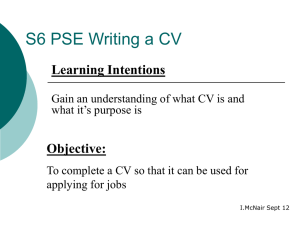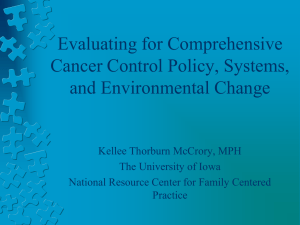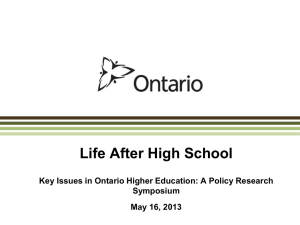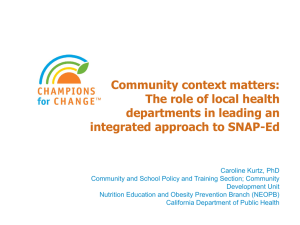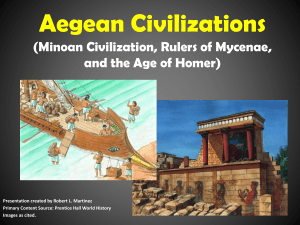MSPSE - Blackboard
advertisement
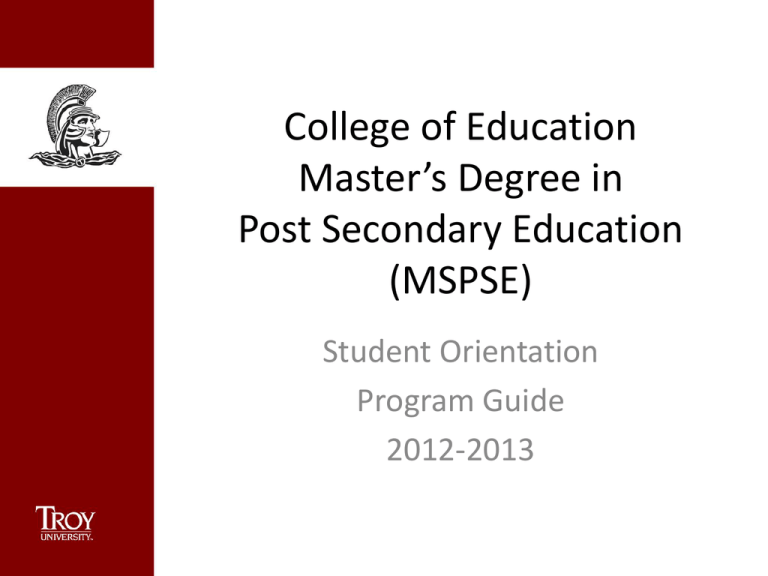
College of Education Master’s Degree in Post Secondary Education (MSPSE) Student Orientation Program Guide 2012-2013 MSPSE Program Overview • The Master of Science in Post Secondary Education is designed to prepare new entrants to the field of post secondary education as professional practitioners in a selected area of study. • Objectives of the Post Secondary Program: – To demonstrate an understanding of the body of knowledge, research bases, instructional techniques, and competencies related to the area of concentration. – To identify and develop alternative solutions to problems through evaluation, synthesis and application of knowledge, theories and concepts in the area of concentration. – To demonstrate knowledge of various models of education, and social and cultural influences on post secondary education, – To demonstrate an understanding of learning styles and their relationship to student achievement. This Program is Designed For… • Professionals who work closely with adult populations in instructional, advising, or service capacities. • Professionals who design training and development for education, corporate, or military organizations. • Professionals who manage educational technology and inventory at educational organizations. • Professionals who seek careers at technical colleges, twoyear colleges, or four-year colleges/universities in office management, program development, student affairs, or business/administrative services. • Instructors wanting to teach at the two-year college level in areas such as biology, criminal justice, English, general science, mathematics, political science, social science, or psychology. Keep in Mind • The MSPSE is not a teacher licensure program. You would need to contact your state education certification agency to see how this degree fits with alternative routes to certification. • Some concentrations do provide 18 graduate hours in a subject area but this does not guarantee eligibility to teach in a two-year college. You would need to adhere to the position requirements of each institution. How is the MSPSE Structured? • OPTION I (Alabama campuses only) – Required Core Courses (12 sh) • PSE 6660 Trends and Issues in Adult Education • PSE 6670 Psychological Foundations of the Adult Learner • PSE 6680 Curriculum Development for Adult Education • PSE 6691 Research Methodology – Selected Area of Concentration (18 sh) – Thesis/Field Project/Capstone (6 sh) • OPTION II – Required Core Courses (12 sh) • PSE 6660 Trends and Issues in Adult Education • PSE 6670 Psychological Foundations of the Adult Learner • PSE 6680 Curriculum Development for Adult Education • PSE 6691 Research Methodology – Selected Area of Concentration (18 sh) – Comprehensive Exam How is the MSPSE Structured? • Concentrations (see graduate catalog for availability per location) – – – – – – – – – – – – – – Adult Education* Criminal Justice English Foundations of Education* General Science Higher Education Administration History Instructional Technology* Mathematics Political Science Psychology Public Administration Social Science Teaching English to Students of Other Languages (TESOL) *Concentrations that are available via eTROY How is the MSPSE Structured? • Terms are 9-weeks in length. Graduate students can take a maximum of two courses every nine weeks. • There are three different formats for graduate courses in the MSPSE program. – Weekend Seminar: Students meet approximately one weekend per month (Friday, Saturday, and Sunday) at the home location for each course. Assignments and supplemental work may be conducted online throughout the term. – Weeknight: Students meet 1-2 nights per week at the home location. – eTROY: Students use a web-based course management system called Blackboard to communicate with the instructor, collaborate with classmates, review resources, and submit assignments. There is no face-to-face instruction in this format. • You may take all classes in one format or the other, or any combination of the two, depending on your particular concentration and the availability of on-site and eTROY courses each term. What Are the Expectations of the Program? • Successful graduate students generally write well, are highly organized, and can analyze and synthesize large amounts of information. • Any student taking an online course should have experience as an independent learner, have a reliable working computer, and be internally motivated. Who Are My Advisors? • You are assigned an academic advisor and a faculty advisor after the enrollment process has been completed and you have been cleared to register. • The academic advisor is a TROY student services employee who helps with general questions: – – – – First-term set up Registration holds Drops/withdrawals Processing of paperwork • Academic advisors are assigned by last name and can be reviewed at https://etroy.troy.edu/Personnel/GCStudentServicesAd visors.aspx). Who Are My Advisors? • The faculty advisor teaches full-time in the Master’s Program and has direct knowledge of course content and the professional field. • Contact your faculty advisor every term for issues regarding your progress, concerns, and academic options: – – – – – Pre-requisites Course selection and load each term Course order and pacing Comprehensive exam preparation Academic options at TROY or after graduation Conditions of Admission • Unconditional Admission – Overall GPA of 2.5 OR 3.0 in last 30 semester (45 quarter) hours of undergraduate work – Minimum score of 383 on MAT or 372 (verbal) on GRE • Conditional Admission – May be granted if unconditional admission requirements are not met. – Student must maintain a 3.0 average in the first nine hours (3 courses) to be admitted unconditionally. • Temporary Admission – Granted for one semester pending receipt of official transcripts and scores. – Registration will be blocked after one semester. Can I Transfer Courses to TROY? • Up to 6 sh (2 courses) of graduate classes may be approved for transfer into our program. • Your transcript can be evaluated for this request after you have successfully passed 9 hours of coursework with TROY. VA Certification • VA students should contact their local VA Certifying Official to obtain a transient authorization for each eTROY course and submit the transient authorization to Jason Messick (jmessick@troy.edu) or Travis McCullough (tmccullough7274@troy.edu) to initiate the school’s certification of enrollment. • This should be done in the middle of each term for the following term. • To ensure a place in the desired classes, student should register as early as possible, since there are limitations in eClassroom capacity and eClass size. • Request for transfer credit must be made in writing by the student through his/her faculty advisor. It is the student’s responsibility to initiate this request. Note conditions of transfer credit in the Graduate Catalog. VA Certification • Current tuition is listed in the University’s semester schedule. • Active duty service members must enroll through the education portal of their service (i.e., goarmyed, WAVE, etc.) in order to TA benefits. • Questions regarding their eligibility for tuition assistance benefits should be directed to their servicing Education Centers. Americans with Disabilities Act • Troy University supports Section 504 of the Rehabilitation Act of 1973 and the Americans with Disabilities Act of 1990, which insure that postsecondary education students with disabilities have equal access to all academic programs, physical access to all academic programs, physical access to all buildings, facilities, and events, and are not discriminated against on the basis of disability. • Eligible students, with appropriate documentation, will be provided equal opportunity to demonstrate their academic skills and potential through the provision of academic adaptations and reasonable accommodations. • Further information including appropriate contact information, can be located through TROY’s Office of Human Resources at http://www.troy.edu/humanresources/index.html. How Do I Get Started? • Once you have received a “Welcome to TROY” correspondence from your academic advisor, contact your faculty advisor via the contact information listed on your correspondence. • You and your faculty advisor will discuss your program plan and course of study, the pacing and order of courses, and a degree plan. • You will then need to register for classes through Web Express and order books from the online book store. • You will access Blackboard (http://troy.blackboard.com) to view your course. Degree Candidacy • You are responsible for meeting with your faculty advisor to complete and submit your degree plan. • Eligibility: – Unconditional admission status – At least 9 sh of coursework completed. – 3.0 GPA • Applications for Admission to Candidacy are located in the Graduate Catalog near the appropriate degree program. In What Order Should I Take Courses? • One of the purposes of faculty advisement is to recommend courses and a pattern of sequence to students. – It is recommended that PSE 6660, PSE 6670, and PSE 6691 be completed within the first 2-3 terms of the program. – PSE 6680 should be the last core course taken, since it is an application of knowledge from a good portion of the MSPSE program. – PSE 6691 should definitely be passed before registering for the comprehensive exam. In What Order Should I Take Courses? Recommended Pacing Adult Education 1st Term PSE 6670 PSE 6660 2nd Term PSE 6691 ADE 6600 3rd Term ADE 6674 ADE 6653 4th Term ADE 5560 PSE 6680 5th Term ADE 6606 ADE 6630 Recommended Pacing Foundations of Education 1st Term PSE 6670 PSE 6660 2nd Term PSE 6691 PSE 6642 3rd Term PSE 6653 PSE 6658 4th Term PSE 6680 PSE 6651 5th Term PSE 6612 PSE 6615 In What Order Should I Take Courses? Recommended Pacing Instructional Technology 1st Term PSE 6670 EDU 6606 2nd Term PSE 6691 PSE 6660 3rd Term EDU 6613 EDU 6616 4th Term EDU 6607/6614 PSE 6680 5th Term EDU 6617 EDU 6618 Requirements for Graduation • Have a cumulative 3.0 GPA. • File an Intent to Graduate form with the Graduate Records office one term/semester prior to graduating. • Register for and pass the MSPSE Comprehensive Exam. Comprehensive Exam • The MSPSE comprehensive examination offers each candidate for the master’s degree an opportunity to demonstrate his/her ability to synthesize and apply knowledge acquired during the course of study. • The MSPSE Comprehensive Exam covers all 10 courses in the program and students are responsible for mastering course objectives to prepare. • Students respond to four essay questions (1 research, 1 core, 2 concentration). Examination questions are designed to determine whether or not a candidate: – Has mastered program content – Can present information and ideas in a complex, creative, and orderly manner – Can use theory and research to support assumptions and conclusions Comprehensive Exam • To prepare for this exam, students should retain all study materials, syllabi, notebooks, and textbooks from the courses they have taken. • Students register one term prior to graduation with their home location when they submit the Intent to Graduate. • eTROY students must submit a “Course Exam Proctor Form” to arrange for a testing site. • Students should request the most recent Comprehensive Examination Policies, Procedures, and Study Guide from their faculty advisors. General Information • How do I order textbooks? – MBS Direct can be accessed via http://bookstore.mbdsdirect.net/troy.htm or by phone at 1-800-325-3252. – You will be able to access the books for your term by choosing Option 1 or 2 and then by choosing your specific home location. – The electronic book voucher program is for students with approved financial aid, VA Chapter 31 benefits, and other tuition assistance programs. • The student’s VA Form 1905, DD 1556 or other TA Form must authorize book charges and list the amount authorized. • A 10% handling fee is charged for using the book voucher system. General Information • Where is the library? – Global Campus students utilize TROY’s extensive digital library, which gives students access to online databases and interlibrary loan: http://library.troy.edu. – Learn how to use the library by going to http://uclibrary.troy.edu/tutorial. MSPSE Faculty Faculty Location Dr. Riad Aisami Augusta, GA Dr. Kimberly Burgess Albany, GA Dr. Marci Goldstein Tampa, FL Dr. Don Hardy Atlanta, GA Dr. Dianne Lawton Brunswick, GA Dr. Peter Paige Augusta, GA Dr. April Parker Columbus, GA Dr. Joseph Reynolds Montgomery, AL Dr. Dionne Rosser-Mims Covington, GA Dr. Jonathan Taylor Montgomery, AL
